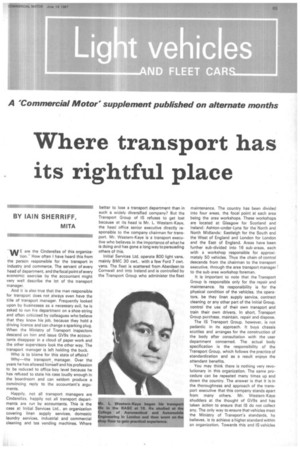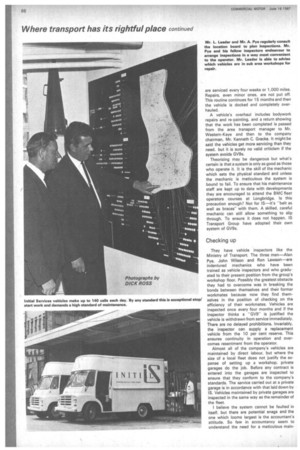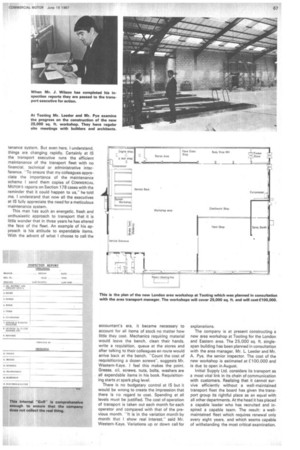Where transport has its rightful place
Page 67

Page 68

Page 69

If you've noticed an error in this article please click here to report it so we can fix it.
BY IAIN SHERRIFF, MITA
"W E are the Cinderellas of this organiza tion." How often I have heard this from the person responsible for the transport in industry and commerce. The servant of every head of department, and the focal point of every economic exercise by the accountant might very well describe the lot of the transport manager.
And it is also true that the man responsible for transport does not always even have the title of transport manager. Frequently looked upon by businesses as a necessary evil, he is asked to run his department on a shoe-string and often criticized by colleagues who believe that they know his job, because they hold a driving licence and can change a sparking plug. When the Ministry of Transport inspectors descend on him and issue GV9s the accountants disappear in a cloud of paper work and the other supervisors look the other way. The transport manager is left holding the buck.
Who is to blame for this state of affairs?
Why—the transport, manager. Over the years he has allowed himself and his profession to be reduced to office-boy level because he has refused to state his case loudly enough in the boardroom and can seldom produce a convincing reply to the accountant's arguments.
Happily, not all transport managers are Cinderellas, happily not all transport departments are run by accountants. This is the case at Initial Services Ltd., an organization covering linen supply services, domestic laundry services, industrial and commercial cleaning and tea vending machines. Where better to lose a transport department than in such a widely diversified company? But the Transport Group of IS refuses to get lost because at its head is Mr. L. Western-Kaye, the head office senior executive directly responsible to the company chairman for transport. Mr. Western-Kaye is a transport executive who believes in the importance of what he is doing and has gone a long way to persuading others of this.
Initial Services Ltd. operate 800 light vans, mainly B MC 30 cwt., with a few Ford 7 cwt. vans. The fleet is scattered from Aberdeen to Cornwall and into Ireland and is controlled by the Transport Group who administer the fleet maintenance. The country has been divided into four areas, the focal point at each area being the area workshops. These workshops are located at Glasgow for Scotland and Ireland: Ashton-under-Lyne for the North and North Midlands: Eastleigh for the South and the West of England and London for London and the East of England. Areas have been further sub-divided into 16 sub-areas, each with a workshop responsible for approximately 50 vehicles. Thus the chain of control descends from the chairman to the transport executive, through the area transport manager to the sub-area workshop foreman.
It is important to note that the Transport Group is responsible only for the repair and maintenance. Its responsibility is for the physical condition of the vehicles, the operators, be they linen supply service, contract cleaning or any other part of the Initial Group, control the use of their own transport and train their own drivers. In short, Transport Group purchase, maintain, repair and dispose.
The IS Transport Group, however, is not pedantic in its approach. It buys chassis scuttles and arranges for the construction of the body after consultation with the user department concerned. The actual body specification is the responsibility of the Transport Group, which follows the practice of standardization and as a result enjoys the attendant benefits.
You may think there is nothing very revolutionary in this organization. The same procedure can be repeated many times up and down the country. The answer is that it is in the thoroughness and approach of the transport executive that this company stands apart from many others. Mr. Western-Kaye shudders at the thought of GV9s and has taken action to ensure that IS do not collect any. The only way to ensure that vehicles meet the Ministry of Transport's standards, he believes, is to achieve a higher standard within an organization. Towards this end IS vehicles are serviced every four weeks or 1,000 miles. Repairs, even minor ones, are not put off. This routine continues for 15 months and then the vehicle is docked and completely overhauled.
A vehicle's overhaul includes bodywork repairs and re-painting, and a return showing that the work has been completed is passed from the area transport manager to Mr. Western-Kaye and then to the company chairman, Mr. Kenneth C. Gracke. It might be said the vehicles get more servicing than they need, but it is surely no valid criticism if the system avoids GV9s.
Theorizing may be dangerous but what's certain is that a system is only as good as those who operate it. It is the skill of the mechanic which sets the physical standard and unless the mechanic is meticulous the system is bound to fail. To ensure that his maintenance staff are kept up to date with developments they are encouraged to attend the BMC fleet operators courses at Longbridge. Is this precaution enough? Not for IS—it's "belt as well as braces" with them. A skilled, careful mechanic can still allow something to slip through. To ensure it does not happen, IS Transport Group have adopted their own system of GV9s.
Checking up
They have vehicle inspectors like the Ministry of Transport. The three men—Alan Pye, John Wilson and Ron Lawson—are indentured mechanics who have been trained as vehicle inspectors and who graduated to their present position from the group's workshop floor. Possibly the greatest obstacle they had to overcome was in breaking the bonds between themselves and their former workmates because now they find themselves in the position of checking on the efficiency of their workmates. Vehicles are inspected once every four months and if the inspector thinks a ''GV9" is justified the vehicle is withdrawn from service immediately. There are no delayed prohibitions. Invariably, the inspector can supply a replacement vehicle from the 10 per cent reserve. This ensures continuity in operation and overcomes resentment from the operator.
Almost all of the company's vehicles are maintained by direct labour, but where the size of a local fleet does not justify the expense of setting up a workshop, private garages do the job. Before any contract is entered into the garages are inspected to ensure that they conform to the company's standards. The service carried out at a private garage is in accordance with that laid down by IS. Vehicles maintained by private garages are inspected in the same way as the remainder of the fleet.
I believe the system cannot be faulted in itself, but there are potential snags and the one which looms largest is the accountant's attitude. So fevv in accountancy seem to understand the need for a meticulous main
tenance system. But even here, I understand, things are changing rapidly. Certainly at IS the transport executive runs the efficient maintenance of the transport fleet with no financial, technical or administrative interference. -To ensure that my colleagues appreciate the importance of the maintenance scheme I send them copies of COMMERCIAL MOTOR'S reports on Section 178 cases with the reminder that it could happen to us," he told me. I understand that now all the executives at IS fully appreciate the need for a meticulous maintenance system.
This man has such an energetic, fresh and enthusiastic approach to transport that it is little wonder that in three years he has altered the face of the fleet. An example of his approach is his attitude to expendable items. With the advent of what I choose to call the accountant's era, it became necessary to account for all items of stock no matter how little they cost. Mechanics requiring material would leave the bench, clean their hands. write a requisition, queue at the stores and after talking to their colleagues en route would arrive back at the bench. "Count the cost of requisitioning a dozen screws". suggests Mr. Western-Kaye. I feel this makes the point. Grease, oil, screws, nuts, bolts, washers are all expendable items in his book. Requisitioning starts at spark plug level.
There is no budgetary control at IS but it would be wrong to create the impression that there is no regard to cost. Spending at all levels must be justified. The cost of operation of transport is taken out each month for each operator and compared with that of the previous month. "It is in the variation month by month that I show real interest." said Mr. Western-Kaye. Variations up or down call for explanations.
The company is at present constructing a new area workshop at Tooting for the London and Eastern area. The 25,000 sq. ft. singlespan building has been planned in consultation with the area manager, Mr. L Leeder and Mr. A. Pye, the senior inspector. The Cost of the new workshop is estimated at £100,000 and is due to open in August.
Initial Supply Ltd. considers its transport as a most vital link in its chain of communication with customers. Realizing that it cannot survive efficiently without a well-maintained transport fleet the board has given the transport group its rightful place as an equal with all other departments. At the head it has placed a capable leader who has recruited and inspired a capable team. The result: a wellmaintained fleet which requires renewal only every eight years, and which seems capable of withstanding the most critical examination.




































































































































